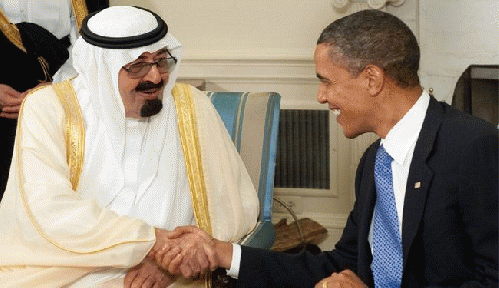By Nicola Nasser*
Writing in The Washington Post on February 27, 2011, Rachel Bronson asked: "Could the next Mideast uprising happen in Saudi Arabia?" Her answer was: " The notion of a revolution in the Saudi kingdom seems unthinkable."
However, On September 30 the next year, the senior foreign policy fellow at the Saban Center for Middle East Policy Bruce Riedel concluded that the "revolution in Saudi Arabia is no longer unthinkable."
To preempt such a possibility, the kingdom in March 2011, in a "military" move to curb the tide of the Arab popular uprisings which raged across the Arab world from sweeping to its doorsteps, the kingdom sent troops to Bahrain to quell similar popular protests.
That rapid reactive Saudi military move into Bahrain heralded a series of reactions that analysts describe as an ongoing Saudi-led counterrevolution.
Amid a continuing succession process in Saudi Arabia, while major socioeconomic and political challenges loom large regionally, the kingdom is looking for security as far away as China, but blinded to the shortest way to its stability in its immediate proximity, where regional understanding with its geopolitical Arab and Muslim neighborhood would secure the kingdom and save it a wealth of assets squandered on unguaranteed guarantees.
In his quest to contain any fallout from the "Arab Spring," Saudi King Abdullah Ben Abdel-Aziz selectively proposed inviting the kingdoms of Jordan and Morocco to join the Cooperation Council for the Arab States of the Gulf, known as the Gulf Cooperation Council (GCC), leading The Economist on May 19, 2011 to joke that the organization should be renamed the "Gulf Counter-Revolutionary Club." For sure including Iraq and Yemen would be a much better addition if better security was the goal.

Saudi King Abdullah Ben Abdel-Aziz and US President Barak Obama
(Image by Google archives) Details DMCA
Ahead of US President Barak Obama's official visit to the kingdom by the end of this March, Saudi Arabia was looking " forward to China as an international magnate with a great political and economic weight to play a prominent role in achieving peace and security in the region," according to Defense Minister and Crown Prince Salman Bin Abdulaziz Al Saud who was in Beijing from March 13 to 16 "to enhance cooperation with China to protect peace, security and stability in the region." He was quoted by a statement from the Saudi Press Agency .
Next Page 1 | 2 | 3 | 4 | 5 | 6
(Note: You can view every article as one long page if you sign up as an Advocate Member, or higher).




